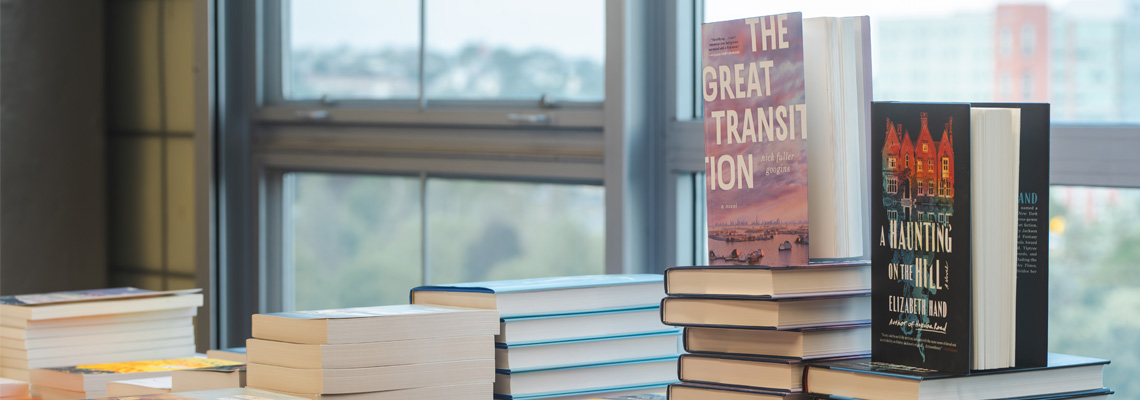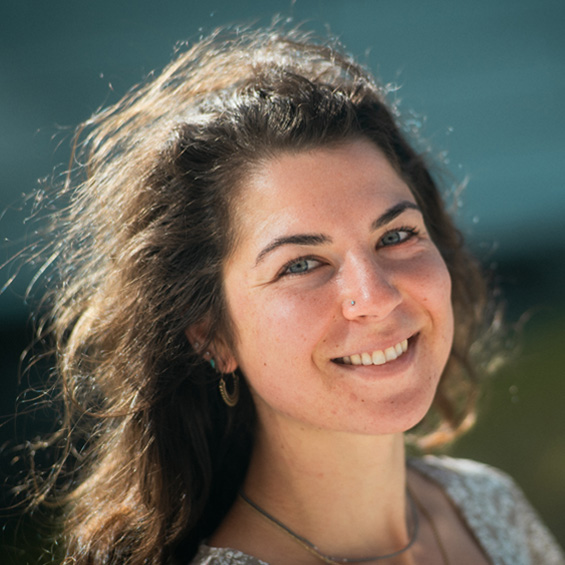Lea Smith (she/her) is a current graduate student in the Creative Writing MFA at Stonecoast and will graduate in June 2025. Lea received a BA in English with a minor in Creative Writing in December 2022 from the University of Southern Maine (USM). She sat down and shared her experience as an undergraduate and graduate student at USM and gave an inside look at how she decided on her area of study major and future to pursue a career in writing.
Why did you decide to attend the University of Southern Maine?
So after high school, I wanted to take some time off to travel. I guess I didn’t really have any plans to attend college. I was really enjoying traveling. And then I was teaching yoga, and that was really lovely. And I was on my way to becoming a yoga therapist. Then I decided to move out of the midcoast area and move to Portland. And I ended up moving into an apartment that was a three-minute walk from USM (Portland) campus. So I kind of stared at the USM campus every day and was like, I wonder what it would be like to go there. And I scheduled a campus tour, and I just had this overwhelming feeling that I needed to go there. I just felt like I needed to stop what I was doing, which was the yoga therapy program in…Texas at that point. And actually pursue something. Then I decided to apply and I got in.
Why did you choose your undergraduate program?
Originally, I chose social work with a minor in public health because I felt that was a really good launching point from which I could carry my yoga teaching forward. So I had that spirit of wanting to help my community and make my community healthier and make it a better place. I did that for the first two years, and then COVID hit. And in the midst of lockdown, I found myself writing a lot more, and I have always been a writer. So I got back into writing a lot, and I had been a writer for a long time. During COVID and quarantine, I just kind of found my love for it again I felt like I needed to change. I chose the English degree with a minor in creative writing.
Tell us about your undergraduate student experience.
So I started my undergrad when I was 23. I really didn’t have a big interest in getting that residential life experience, and I was there to really work. I was a little bit curious about how that would work out. But, I mean, the Portland campus is very commuter-friendly, and most non-traditional students are commuters. So, you know, very commuter-friendly. There was always a commuter appreciation week. They really put in good work for the commuters. Like I said, I was not here necessarily for the social aspect, but I think I got a really good education, and I developed really good relationships with my professors. Some of whom I still talk to now after graduating undergrad a year and a half ago. I just felt really supported.
How did you decide on your graduate program?
In the undergraduate program, I had Justin Tussing as a professor in two different classes. It was fiction writing and then a fiction workshop. And he told me about the program. And my senior summer, I decided through him to attend the Stonecoast Writers Conference, which was happening the summer of 2022. And so I enrolled in that, and that took up three credits, which was amazing. I went, and at that point it was at the Harraseeket Inn in Freeport and I loved it. It was just so much fun. I met a few students in the program, and people seemed to be really enjoying it. I decided upon graduating that I wanted to apply for the program. I really wanted to take my writing further.
What makes a low residency program like this unique?
It really allows students to have a life outside of school. We are only together twice a year for seven to ten days. And then we have those six months in between to work with our mentor. But, you know, people who have families, people who work full-time jobs, people who have any number of things that they need to attend to in those six months can do that. I think that attracts a lot of people who might not be able to do a program that is full-time, year-round, five days a week, you know, however it’s structured. I think Stonecoast, as well as other low-residency programs, are definitely unique in that way. And it definitely encourages students who normally wouldn’t be able to.
What do you like most about the Creative Writing MFA program?
So there’s this aspect of non-competition. It’s not a competitive program. People are not here to be the best writers over other students. People are here to lift each other up and to support everyone and to support each other. And I think that’s really important because, you know, there are cutthroat MFA programs out there where people are trying to be the best. And we should all try to be the best version of ourselves. But, we’re not here to be in a contest with everyone else….We’re all here to learn from each other. We’re all here to gain something beautiful, and that’s this lovely Stonecoast community. I think Stonecoast does a really good job of forging community. People in my cohort meet up in between those six months. I’ve had people stay with me from the program before. And so, yeah, the community aspect is really nice.
Have you had any mentors from your undergraduate or graduate studies that have made an impact on you?
Justin (Tussing) was the original mentor in my undergrad. I had him as a mentor senior year. And, like I said, he was kind of that on-ramp towards the Stonecoast program by introducing me to the Writers Conference. And then here at Stonecoast, I’ve had the pleasure of working with J.J. Amawaro-Wilson and Cara Hoffman as my mentors so far, and both of them have just been so incredibly helpful. They’ve both transformed my writing both from a grammar perspective and just deepening my characters and working on my strengths and recognizing my weaknesses. And vice versa, working on my weaknesses and recognizing my strengths, too.
Would you recommend the Creative Writing MFA program to interested students? Why?
Yes, I absolutely would. And it kind of goes back to that accessibility aspect of it. I like what I do in my outside life. I like to work. I like where I live. It’s not in Maine anymore, but I can still have this connection to this school. I definitely recommend people who have a family or have a full-time job to think about because this program does allow that really great flexibility. And also, it’s just plain fun. We have a really good time here. I’ve learned so, so much at the residencies and also in between from my mentors, and I’ve generated so much work. So I definitely recommend it to people who want to work but who might feel like they aren’t the traditional college student, eligible college student because they absolutely are.
How will what you have learned during your undergraduate studies in the Creative Writing MFA program guide you professionally post-graduation?
So I am also on the team for the Stonecoast Review, which is the student-led literary journal here, and I’ve just moved into the executive editor position. And so I already have this really great addition to my resume. I’ve been freelance writing for a few publications, and I’ve been talking to Edible New Hampshire about advising for them and about writing for them. It really has already helped with my professional life, even only halfway through. I’m only halfway through the program and things are already working out.
But, I think post-grad this program not only teaches you how to be a good writer, but it also teaches you really valuable things like getting an agent and writing a query letter. I think my goal is to publish as much as I can using what I’ve learned, all the tips and tricks and stuff that I’ve learned. So, that’s what I’ll use.
Do you have a passion for writing? Learn more about the English BA and the Creative Writing MFA here. Or you can connect with the Office of Admissions to request more information.



